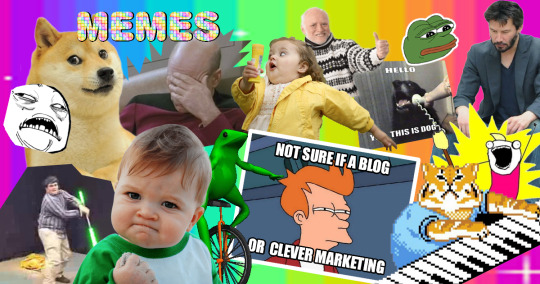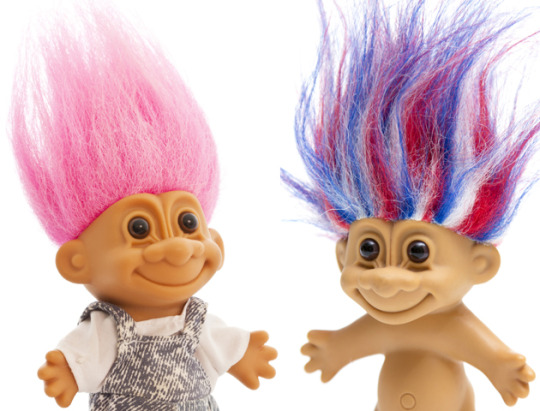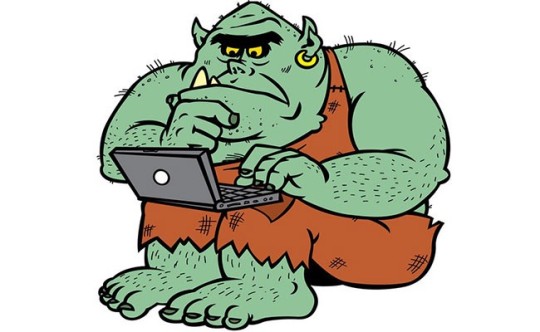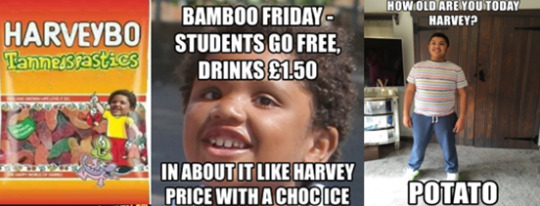#but this is like if we all had to applaud kylie jenner when she discovered cold cereal
Text
That thing when a child is like "hey watch me!" for the 87th time and you do and then they do some dogshit cartwheel and you have to be like "amazing! keep that up and youll be doing flips in no time!" so you can encourage active and enriching behavior even tho its not your kid and youre bored as hell....anyways can't wait for harry styles and kid cudi to destroy more gender norms.
#thank god im invisible here. no discourse#I get we're helping undo by toxic masculinity by encouraging this or w/e#but this is like if we all had to applaud kylie jenner when she discovered cold cereal#so the kardashians would stop bombing kellogs factories or some shit idk
0 notes
Text
There’s a ‘Price’ to pay for meme trolling.
There is no doubt that the social media world are lovers for a good ol’ meme. Need a conversation starter? A witty reply? Or cheering up on a gloomy day? A meme will guarantee you a laugh. However, what constitutes a well-curated, humorous meme? Well, as we all know, humour is subjective. What you and I find funny will differ, of course. But what criteria needs to be met in order for a meme to go viral? What do the creators of memes set out to achieve when sharing them online? Most importantly, is there a line to be crossed? At what point can we agree that a meme no longer has a shared meaning?
I want to look closely at the memes created online targeting Harvey Price, but firstly, let’s get to grips with what we mean by a ‘meme’. Dawkins (2006) describes the practice of ‘memeing’ to involve “participating in the creation or distribution of a powerful, original idea”. He also proposes that a meme is a “unit of cultural transmission”, an idea or collective conscience that a community share. We share this culture like we share genetic characteristics. Like “biological organisms evolve based on the natural selection of genes, cultures evolve based on the natural selection of memes”. Despite what this wishy-washy, too-poetic-to-be-true analysis may suggest, memes speak volumes about the humour and beliefs within society. Remember these?

With the relationship between the image the caption having no etymological meaning, the caption of a meme can be chopped and changed depending on the intention of the creator. Examples which spring to mind are “Cash me Outside” and the compilations of Arthur memes, in which the captions are often quite predictable. Nonetheless, the meaning of a meme is not always required to be clear and linear. Most of the time they are abstract and nonlinear, in fact. Above all, the most important function of a meme is to depict ‘coolness’.


Virality and Memes: the good, the bad but mostly the ugly.
Kim Kardashian, or more specifically her career, is a perfect example of how virality can change a life for the better. All thanks to a leaked sex tape in 2007. You can guarantee that this certainly wasn’t one of her finest, most glamorous moments, but I’m sure she’s never looked back. This scandalous footage landed her a career of fame. And now? Over a decade later we spend our lives Keeping Up With The Kardashians. Most recently, with her half-sister Kylie Jenner competing with an egg to get the most liked photo of all time on Instagram, and her step-father Bruce Jenner’s latest transition in becoming Caitlyn, there is no doubt that this family are familiar with being the centre of media attention. With what seemed to be the world going crazy over an egg, this was an attempt, an extremely successful attempt, to promote mental health, specifically how the pressures of social media can make us ‘crack’. Harmless virality, right? What may have once been perceived to be attacks on the Kardashian family, have ultimately led these stars up a path of wealth and success. Correct me if I’m wrong, but I don’t see roaring headline complaints about them loathing this lavish lifestyle?
But it isn’t always this rosy…
What is the first thing that comes to your head when you think of a troll?
This one?

What about this one?

Or perhaps this one?

Both through her own career as a supermodel and TV presenter, and since the birth of her son in 2002, Katie Price has experienced, first hand, the ugly truth of virality, specifically in the form of trolling. Tweets, memes, death threats, you name it, attacking her son for the colour of his skin as well as his disabilities. Unlike the Kardashians, Harvey is blissfully unaware of the extremes to which he is taunted daily online. But why do we live in a world which allows people to get away with such disgusting behaviour? On a mission, not only to protect Harvey from this online abuse, but anyone who has ever been subject to trolling, in 2017, she started a petition. This eventually received over 200,000 signatures in a bid to make online trolling illegal. Despite her best efforts at exposing these trolls herself, she discovered there to be little, if any, law enforcement in place to protect victims such as Harvey. Being what Goldhaber (1997) describes to be a “star”, fortunately, she was equipped with the tools to attract mass media attention about the issue of online trolling, to which she appeared on many day time TV programmes informing people about ‘Harvey’s Law’.
In spite of her good intentions, it was no shock that trolls not only continued to fire hate filled tweets about Harvey, but curate memes mocking things he has said on TV appearances, as well as taking content Katie had uploaded to her own social media of Harvey as inspiration.
Any mum would agree that just because she’s in the public eye, it should not mean that she should be deterred from posting photos of her children on social media to protect them from being targeted by trolls.
A clip which many may be familiar with is their appearance on Loose Women, in which he swears on live TV. Although trolls immediately took to photoshop to mock this display of innocence, many could argue that this is part of the viscous cycle of attention economy (Goldhaber, 1997). In order for trolls to give Harvey attention, they need a source to retrieve it from. Contrary to her pledge to protect Harvey from the doom and gloom of social media that we all know and love, she was recently slammed for ‘baiting trolls’ (The Sun, 2019) by setting Harvey up with his own Instagram account. Is this ultimately an invitation for trolls to attack him? Does it provide trolls with the ‘new’ and ‘original’ content they so desperately desire? What do we think, is she now responsible for the trolling Harvey will now be exposed to online?

youtube
A more recent adaptation of memes, known as GiFs, has also been a platform explored by trolls in order to attack Harvey further. During my research into this topic, from simply typing into my search engine “Harvey Price”, this result appeared…

As if memes weren’t exhilarating enough to fulfil the trolls in their cyber-attacks, GiFs of Harvey can now be generated through this site, ultimately allowing people to express themselves in online conversation through indirectly mocking Harvey. But to them it’s nothing serious. Just a passing comment. What angers me the most about this GiF generator is the use of the term “popular”, suggesting that people visiting this site will have access to nothing but the best GiFs - what the trolls would label to be most successful in terms of their virality. First and full most, who is spending their time designing these websites, and secondly, are they proud? Are they THAT disconnected from their emotions that they don’t view this young man as a human being?
But do these memes live up to the definition of ‘memeing’ proposed by Dawkins (2006)?
Are they powerful?
Definitely not.
But perhaps in one way? They’re powerful for delivering the message that no matter what your race, your sexual orientation, your disabilities or your religion, there will always be people in the world who disagree or are opposed to it. Sure, trolls can hide behind their twitter username, but can they hide from their own insecurities? This is important to consider. What is the need for them to create this content? For how long is it funny? A day? A couple of hours?
Are they original?
Most certainly not. If anything, they lack originality. Well, put it this way, I can’t hear anyone applauding these creators for their outstanding pieces of work…
Is it cool?
You must be joking?
The creators of this content might have themselves fooled that they are some- what inspirational to the rest of the nation, or that they’re admired by their fellow meme-ers for their hardcore memeing. But the rest of the nation? The decent human beings of the nation? Disgraceful. Unintelligent. Bullies. A valuable point to be made here is that creators of memes believe they’re in a superior position to those they are ‘memeing’ about, hence why when these memes are shared and distributed online, they appear ‘funny’ to those who perceive Harvey as inferior to them.
And this is why we can’t have nice things…
Phillips (2015) argues that essentially, trolls “are the reason we can’t have nice things online”. He suggests that the online space is meant to be a community where people can feel safe in sharing their thoughts; through tweeting, or sharing snapshots of their life via Instagram. It appears that sadly, this is no longer the case. Trolls are “born and embedded” within dominant institutions. As a result, the saddest, and most frustrating thing of all about meme trolling, is that as long as trolls have the community to support them, and until social media platforms build stronger, much more stable networks which block out these trolls, there will be no end to trolling. This “unapologetically racist humour and legitimate corporate punditry” will only seize to exist online if the threat of the law was to stand between the troll and the ‘send’ button. Why, in those “golden years” between 2008-2011 in which the trolling subculture became “crystalized”, did establishers of these social networks make a stand for this unwanted behaviour? Why is a mother, regardless of whether she’s famous or simply just the mum next door, forced to make a pledge for this internet craze to be wiped from our screens?
How can we make a difference?
It is important to not turn a blind eye to this kind of behaviour online. Although it may not directly affect you, there will always be someone else is in the firing line. Avoid retweeting, sharing and even posting content online which may later come back to bite you. As someone who has been a present, and an active user of social media since my early teens, during this time, I was extremely naïve to the content online. I’m sure there have been posts which I would look back on now and think how my online presence has changed. My humour has changed. What I like and post about has definitely changed, but most of all, social media as a 20-year-old seems a much scarier place to be than when I was 13. Do you agree?
References:
Phillips, W. (2015). This Is Why We Can’t Have Nice Things: Mapping the Relationship Between Online Trolling and Mainstream Culture. Massachusetts: MIT Press.
Dawkins, R. (2006). The Selfish Gene. Oxford: Oxford University Press.
Gibb, J. (2019, January 28). Katie Price accused of ‘baiting’ trolls. Retrieved from: https://www.thesun.co.uk/tvandshowbiz/8300554/katie-price-accused-of-baiting-trolls-by-giving-son-harvey-his-own-instagram-account-and-failing-to-protect-him/
11 notes
·
View notes